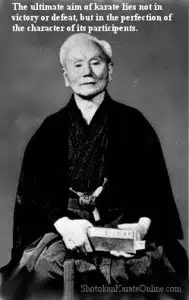Gichin Funakoshi’s 20 Guiding Principles of Karate-Do (Nijū Kun) Explained
Master Gichin Funakoshi, the founder of Shotokan karate, laid out the Twenty Precepts of Karate (Niju kun), which are there as a guide for all karateka to follow and adhere to. These principles form the foundations of Shotokan karate. These twenty principles were based heavily on Bushido and Zen.
The principles allude to notions of respect, humility, compassion, patience, awareness and both an inward and outward calmness.

Shotokan Nijū kun (Shotokan 20 Principles)
1. Karate-do begins with Rei and ends with Rei. (Rei means courtesy / respect)
2. There is no first strike in karate.
3. Karate is an aid to justice.
4. First know yourself then know others.
5. Spirit comes first, technique second.
6. Always be ready to set your mind free.
7. Misfortune comes out of laziness accidents arise from negligence.
8. Do not think that karate training is only in the dojo.
9. It will take your entire life to learn karate, there is no limit.
10. Put Karate into your everyday life any you will find its subtle secrets.
11. Karate is like boiling water, without heat, it returns to its tepid state.
12. Do not think that you have to win – rather that you do not have to lose.
13. Make adjustments according to your opponent.
14. The outcome of the battle depends on how you handle weakness and strength.
15. Think of hands and feet as swords.
16. When you leave home, there are a million enemies waiting for you.
17. Beginners must master low stances and posture, natural body positions are for advanced students.
18. Practice prescribed sets of techniques exactly; actual combat is another matter.
19. Do not forget the employment of withdrawal of power, the extension or contraction of the body, the swift or leisurely application of technique.
20. Be constantly mindful, diligent, and resourceful, in your pursuit of karatedo (the Way of karate).
Shotokan Niju Kun

FAQ: Gichin Funakoshi's 20 Guiding Principles (Nijū Kun)
They are a list of 20 moral and philosophical maxims, known as the Nijū Kun (Twenty Precepts of Karate), which serve as a foundational guide for all students of karate (karateka).
1. Karate-do begins with Rei and ends with Rei. (Rei means courtesy / respect)
2. There is no first strike in karate.
3. Karate is an aid to justice.
4. First know yourself then know others.
5. Spirit comes first, technique second.
6. Always be ready to set your mind free.
7. Misfortune comes out of laziness accidents arise from negligence.
8. Do not think that karate training is only in the dojo.
9. It will take your entire life to learn karate, there is no limit.
10. Put Karate into your everyday life any you will find its subtle secrets.
11. Karate is like boiling water, without heat, it returns to its tepid state.
12. Do not think that you have to win - rather that you do not have to lose.
13. Make adjustments according to your opponent.
14. The outcome of the battle depends on how you handle weakness and strength.
15. Think of hands and feet as swords.
16. When you leave home, there are a million enemies waiting for you.
17. Beginners must master low stances and posture, natural body positions are for advanced students.
18. Practice prescribed sets of techniques exactly; actual combat is another matter.
19. Do not forget the employment of withdrawal of power, the extension or contraction of the body, the swift or leisurely application of technique.
20. Be constantly mindful, diligent, and resourceful, in your pursuit of karatedo (the Way of karate).
The Nijū Kun were created by Master Gichin Funakoshi (1868–1957), the founder of the Shotokan school of karate.
The 20 principles are heavily based on the philosophies of Bushido (the Way of the Warrior) and Zen.
The principles allude to notions of respect, humility, compassion, patience, awareness, and cultivating both an inward and outward calmness in everyday life.
Rei means courtesy or respect. This principle establishes that respect is the essential attitude that must govern the entire practice of karate, signifying that the Way of Karate is one of character development and courtesy.
The philosophy encourages a non-aggressive stance, embodied by the principle "There is no first strike in karate." It stresses that karate is an "aid to justice," meant for defense and morality, not for initiating violence. “Karate ni sente nashi” (There is no first attack in karate)
No. Principles 8 and 10 make it clear that the teaching is for life: "Do not think that karate training is only in the dojo," and "Put Karate into your everyday life any you will find its subtle secrets."
According to Principle 5, "Spirit comes first, technique second." This means that the student's mindset, resolve, and moral character are more vital than mere physical skill.
Principle 9 states, "It will take your entire life to learn karate, there is no limit." Karatedo (The Way of Karate) is viewed as a lifelong journey of self-improvement and discovery.
Principle 4 advises "First know yourself then know others." This means understanding your own strengths and weaknesses is the necessary first step before attempting to understand and adapt to an opponent.
Principle 7 offers a serious caution: "Misfortune comes out of laziness accidents arise from negligence." This stresses the need for constant effort and mindfulness to avoid unnecessary failures.
Principle 17 states: "Beginners must master low stances and posture, natural body positions are for advanced students." This instructs beginners to focus on building a strong foundation by practicing demanding, formalized stances before transitioning to more relaxed, efficient movements.
Principle 11 states: "Karate is like boiling water, without heat, it returns to its tepid state." This means constant, sustained effort is necessary to prevent skills and conditioning from fading away.

